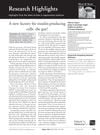Search
for
Sort by
Research
600-630 / 1000+ results
research A New Horizon in Facial Plastic Surgery: Skin Tissue Engineering and Stem Cell Therapy—Reality or Dream?
Stem cells could potentially rebuild missing structures in wounds, improving facial skin replacement techniques.

research Low Level Laser Versus Platelet-Rich Plasma in Treatment of Alopecia Areata: A Randomized Controlled Intra-Patient Comparative Study
Both platelet-rich plasma and low-level laser therapy effectively treat hair loss with minimal side effects and good cost-benefit ratio.
research Transcutaneous Application of Ultrasound Enhances the Effects of Finasteride in Murine Model of Androgenic Alopecia
Ultrasound boosts finasteride's hair growth effects in mice.

research Red LED Light Therapy for Telogen Effluvium in Long COVID Patients With and Without Androgenetic Alopecia
Red LED light therapy helps reduce hair loss and improves hair regrowth in long COVID patients.

research Effect of Skin Type on Efficacy of Laser Treatment for Androgenetic Alopecia: A Review of the Literature
Laser treatment for hair loss works equally well on different skin types, but more research is needed for very dark skin.
research Regeneration of Dermis: Scarring and Cells Involved
Different fibroblasts play key roles in skin healing and scarring.

research Polyclonal Origin and Hair Induction Ability of Dermal Papillae in Neonatal and Adult Mouse Back Skin
Dermal papillae cells, important for hair growth, come from multiple cell lines and can be formed by skin cells, regardless of their origin or hair cycle phase. These cells rarely divide, but their ability to shape tissue may contribute to their efficiency in inducing hair growth.

research The Experimental Study on the Effect of Herbal Extracts on Hair Growth and Acne
Rubus coreanum may help hair growth but not through the tested mechanisms, and none of the herbal extracts help with acne.

research Mutant Laboratory Mice With Abnormalities in Hair Follicle Morphogenesis, Cycling, and Structure: An Update
The document concludes that mouse models are crucial for studying hair biology and that all mutant mice may have hair growth abnormalities that require detailed analysis to identify.
research Lactobacillus Paracasei HY7015 and Lycopus Lucidus Turcz. Extract Promotes Human Dermal Papilla Cell Cytoprotective Effect and Hair Regrowth Rate in C57BL/6 Mice
The substances improved hair regrowth and protected hair cells in humans and mice.

research Research Highlights: Latest Articles in Regenerative Medicine
New treatments for diabetes, central nervous system repair, and cartilage injury were found, and a way to create functional hair follicles from stem cells was developed.

research Discovery of Genes and Proteins Possibly Regulating Mean Wool Fibre Diameter Using cDNA Microarray and Proteomic Approaches
Researchers identified genes and proteins that may influence wool thickness in sheep.

research The Rotterdam Study: Objectives And Design Update
The Rotterdam Study investigates diseases in older adults and has produced many research findings.

research Mesenchymal Stromal Cell Secretome: Influencing Therapeutic Potential by Cellular Pre-Conditioning
Changing how mesenchymal stromal cells are grown can improve their healing abilities.

research Genetic, Hormonal, and Metabolic Aspects of PCOS: An Update
The document concludes that insulin resistance is key in PCOS development and early treatment is crucial to prevent complications.

research The Rotterdam Study: 2012 Objectives and Design Update
The Rotterdam Study updated its design and objectives in 2012, providing insights into various diseases in the elderly, including skin cancer, bone health, liver disease, neurological and psychiatric conditions, and respiratory issues.

research The Rotterdam Study: 2010 Objectives and Design Update
The Rotterdam Study aims to understand various diseases in older adults.

research Increased Copy Number of the TERT and TERC Telomerase Subunit Genes in Cancer Cells
Cancer cells often have more copies of TERT and TERC genes, which helps them grow and could affect patient outcomes.

research The IL-23/IL-17 Pathway in Inflammatory Skin Diseases: From Bench to Bedside
Targeting the IL-23/IL-17 pathway effectively treats several inflammatory skin diseases.

research The Role of Androgen and Androgen Receptor in Skin-Related Disorders
Targeting androgen receptors could be a promising way to treat skin disorders with fewer side effects.

research MicroRNA-302 Increases Reprogramming Efficiency via Repression of NR2F2
MicroRNA-302 helps improve the conversion of body cells into stem cells by blocking NR2F2.

research Hormonal Regulation of Hair Follicles Exhibits a Biological Paradox
Androgens can both stimulate and cause hair loss, and understanding their effects is key to treating hair disorders.

research Female Pattern Hair Loss: A Clinical and Pathophysiological Review
Female Pattern Hair Loss affects women's self-esteem and needs more research for better treatment.

research Simple and Rapid Method to Isolate and Culture Follicular Papillae from Human Scalp Hair Follicles
Researchers developed a quick and easy way to get and grow cells from the base of human hair follicles.

research The Paradox of p53: What, How, and Why?
The p53 protein has complex, sometimes contradictory functions, including tumor suppression and promoting cell survival.

research Post-Transcriptional Regulation of Keratinocyte Progenitor Cell Expansion, Differentiation, and Hair Follicle Regression by miR-22
miR-22, a type of microRNA, controls hair growth and its overproduction can cause hair loss, while its absence can speed up hair growth.

research Spatiotemporal Control of CRISPR/Cas9 Gene Editing
The document concludes that while there are promising methods to control CRISPR/Cas9 gene editing, more research is needed to overcome challenges related to safety and effectiveness for clinical use.

research Concise Review: The Plasticity of Stem Cell Niches: A General Property Behind Tissue Homeostasis and Repair
Stem cell niches are adaptable and key for tissue maintenance and repair.

research The Role of Stem Cells in Cutaneous Wound Healing: What Do We Really Know?
Stem cells have great potential for improving wound healing, but more research is needed to find the best types and ways to use them.